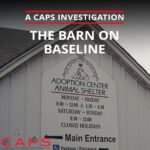Petland Shavano Park
4000 Pond Hill Rd Suite 205
Shavano Park, TX 78231
(210) 592-1234
Date and time of CAPS investigation: 6/7/23, 1216
Approximate number of puppies observed at time of investigation: 40
Puppy enclosures were built into two walls of the store. There were about 18 enclosures in total, each about three feet wide, tall and long, with plastic walls and treated wire floorings. Half of the enclosures had plastic divider walls set in them, making two separate spaces for puppies in each enclosure that were half the width of normal space for puppies. There were one to two puppies in each enclosures space, with about ten having no puppies in them at all. Puppies had small blankets, water bottles, food dishes, and some had toys in the enclosures. About half of the puppies had stickers on their walls showing they were “new arrivals” and couldn’t yet be held by customers.
Puppy prices, employee claims the store inspects breeders
I spoke to an employee (Caucasian male, about 40 years old, 5’7″, 180 lbs., with very short brown hair and a faint beard and moustache) about puppy purchases and the breeders the store uses. Hs said that puppies’ prices generally start at $3,400, but after two weeks their prices drop. There was two nineteen-week-old Cocker Spaniel siblings in an enclosure, and the employee verified that one of them cost $1,500. He told me all the store’s breeders are AKC-registered and USDA-licensed. He said that the store doesn’t buy from USDA breeders who have “like a mark or anything like that.” The employee also said people from the store visit breeders, stating this is because “we like to go out in person and meet and inspect them.”
Dog breeders are “like free-range chicken”
I asked him about the breeding dogs’ living conditions. He said, “So, that, I believe, just depends on the breeder. Now, that being said, not, any, no dog’s going to go their entire life in a kennel. Now, you know what I mean? Sometimes they might be in there at night, or something or another like on those lines. But, in no way, shape, or form is any of our breeders just going to contain them in a small area. These puppies are only here while they’re just basically waiting to go home. But, no as far as like the parents or anything like that, it’s kind of like free-range chicken essentially. So, they might have their own den, but they’re going to be, basically, free range.”
Lie about spent breeding dogs
I asked how long dogs are bred for and what happens to the dogs when they are no longer bred. While the employee admitted not knowing how long dogs are bred, he lied and said that breeders adopt out dogs. He told me, “So, essentially when they’re done, I mean they’re just going to adopt them out to people they know. Other people in their industry.” He then gave a rambling explanation about how breeders do that because they already have connections with veterinarians, who provide discounts to the breeders.
Employee gave partial breeder info for a puppy
I asked to have breeder information on one of the nineteen-week-old Cocker Spaniels. The employee said he wouldn’t show me the complete breeder info but told me it was Kim Williams in Grovespring, MO. His explanation for not giving more information was, “Yeah, I can’t give you any exact address or phone number, unfortunately. Don’t want to, well, the breeders don’t want to kind of, have people harassing them. Just because, you’d be surprised, they’re like oh, your prices are, you know, this and that. If I just contact them, this and that. They don’t want to deal with people, so.”
Evidence of false statements and misrepresentations by store
The employee’s claim that breeding dogs are “free range” is a lie. CAPS obtained Certificates of Veterinary Inspection of puppies sold to the store in 2022. Petland Shavano Park buys from numerous breeders with dozens of breeding dogs, including Elmer Troyer (43-A-5917) who had 77 dogs at a USDA inspection in September of 2022, Chester Beachy (43-A-6272) who had 63 dogs at a USDA inspection in October of 2022, and Earl and David Miller (43-A-5221) who had 174 dogs at a USDA inspection in September of 2022. These breeders have dogs in kennel buildings, not roaming their properties “like free-range chicken.”
The employee’s claim that breeders adopt out their spent dogs to people they know in the breeding industry is also untrue. It is precisely because the dogs are not profitable for breeding that breeders get rid of them. They do not take on non-breeding dogs as pets from each other. Breeders typically sell dogs at auctions, give them to rescues (who must shoulder the burden of the dogs’ medical and rehabilitation costs), or kill them.
The employee’s claim that none of the store’s breeders have “a mark” is false. One of the store’s breeders, Elmer Troyer (43-A-5917), noted above, had a Missouri state inspection in May of 2022, that found he had dirt and grime buildup on doggie-doors, an “accumulation of dirt and dander along the front of the enclosures, kibble on the floor, clipped hair on the floor and grime on the walls and divider walls,” as well as plastic feeders with. “broken, sharp points.” Certificates of Veterinary Inspection from 2022 reveal the store also buys from Daniel Borntreger (43-A-6543). A USDA inspection from July of 2021 found that the gravel of an outdoor portion of pen enclosures for nine Golden Retriever puppies “was completely covered with fecal matter,” and that enclosures that hadn’t been used for two days still had feces in them.
Breeder information obtained while visiting the store
Kim Williams, Grovespring, MO (Kim Williams/Jeff Williams, Dawg Wilde Kennel, Grovespring, MO, 43-A-2372)
USDA inspection on August 24, 2022 shows 135 adults and 63 puppies at the facility.
Breeder information obtained from 2022 and 2023 Certificates of Veterinary Inspection
Chester Beachy, 10495 Monroe Road 1005, Clark, MO 65243, 43-A-6272 (63 adults, 83 puppies on October 2022 USDA inspection).
On September 9, 2021 USDA inspection, Beachy received the following teachable moments: New litter of puppies’ feet falling through flooring, quarantine area had concrete flooring that was not impervious to moisture, couple of water bowls tipped over so dogs/puppies didn’t have access to water.
Daniel Borntreger/Monroe County Puppies, 11722 Rt NN, Madison, MO 65263, 43-A-6543 (56 adults, 35 puppies on July 2021 USDA inspection).
On May 19, 2021 Missouri Department of Ag (MDA) inspection, Borntreger was cited for outdoor portion of sheltered enclosure with 9 puppies completely covered with fecal material and unused enclosures that contained fecal accumulation. On May 18, 2022, MDA inspection, received violation for piles of wood and metal along sides of enclosures.
On USDA inspection July 6, 2021, Borntreger was cited for a Golden Retriever with hair loss on top of head. The middle of the hair loss region was pink and red, appeared slightly swollen and cracked with a yellow substance in cracks. The licensee was instructed to consult a licensed vet within two days. Also received violation for abundance of flies and no pest control in place at time of inspection.
Norman Gingrich, 5388 Audrain 161, Sturgeon, MO 65284, 43-A-6353 (32 adults, 3 puppies on August 2022 USDA inspection).
On Missouri Department of Ag June 1, 2021 inspection, received violation for record keeping. No records on file for a Poodle that is no longer at the facility.
Holly Iben, 21473 200th Ave., Monticello, IA 52310, 42-A-1564 (81 adults, 28 puppies on USDA February 3, 2022 inspection).
On February 4, 2022, received USDA violation for Terrier with loose teeth and instructed to have dog evaluated by vet. Also received violation for no puppy identification numbers for two different litters.
Earl and David Miller, 10569 CR, Oronogo, MO 64855, 43-A-5221 (174 adults, 81 puppies on September 2022 USDA inspection).
Elmer Troyer, 10038 Hwy Y, Clark, MO 65243, 43-A-5917 (77 adults, 42 puppies on September 2022 USDA inspection).
Missouri inspection report dated May 5, 2022 shows Troyer received state violation on January 26, 2021, for three Akitas housed in outdoor facility without structured shelter. Report also indicates prior violation received on Missouri inspection February 15, 2022, doors and frames with buildup of dirt and grime. Facility is in need of a deep cleaning to meet general husbandry standards. Several plastic feeders with broken, sharp points were found. Female goldendoodle housed on concrete floor that had not been sealed.
USDA inspection of February 15, 2022, received violation for excessive, smeared feces covering 50-80% of the flooring in enclosures of the sheltered kennel building. Other violations included outdoor enclosure with 5 dogs with not enough space to sit, stand and lay down, chewed/sharp edges on feeders, empty water bowls, unsealed concrete flooring and lack of written documentation of exams and preventative care.
On USDA inspection May 18, 2022, Troyer received violation for excessive amount of flies inside and outside facility.
Ethan and Garry Zumbach, 21473 200th Ave., Monticello, IA 52310, 42-A-1636 (139 adults, 30 puppies on USDA February 16, 2022, inspection).
On USDA February 16, 2022, inspection, received two violations for incomplete veterinary care information.
Broker information obtained from 2022 Certificates of Veterinary Inspection Reports
Curt and Lori Conrad/Conrad’s Cuddly Canines, 6104 Pike 9, Frankford, MO 63441, 43-B-3659 (0 adults, 53 puppies on September 2021 USDA inspection).
Southpaw Pets, 19624 Owl Road, Neosho, MO 64850, 43-B-3812 (18 adults on January 2023 USDA inspection).
Note regarding number of dogs at above breeding facilities
The number of adult breeding dogs and puppies at the above facilities is consistent with being commercial breeding establishments, also known as puppy mills, that mass produce dogs for resale to pet shops. Please refer to the following link (Summary of legal cases defining “puppy mill”) for a summary of legal cases defining the term “puppy mill.”
Lack of USDA violations
The fact that few breeders and brokers have USDA violations does not mean that none exist. During our undercover investigation of USDA-licensed facilities, we document violations. USDA has made it very easy for licenses not to have violations. In response to regulatory ordinances, USDA was using teachable moments, self-inspections and a trial announced inspection program. Their guidelines also instructed inspectors not to cite ear, eye and dental diseases as veterinary care violations. Due to pressure from animal advocates, USDA has terminated these programs. Nonetheless, the citation of violations by inspectors continues to be extremely limited.




